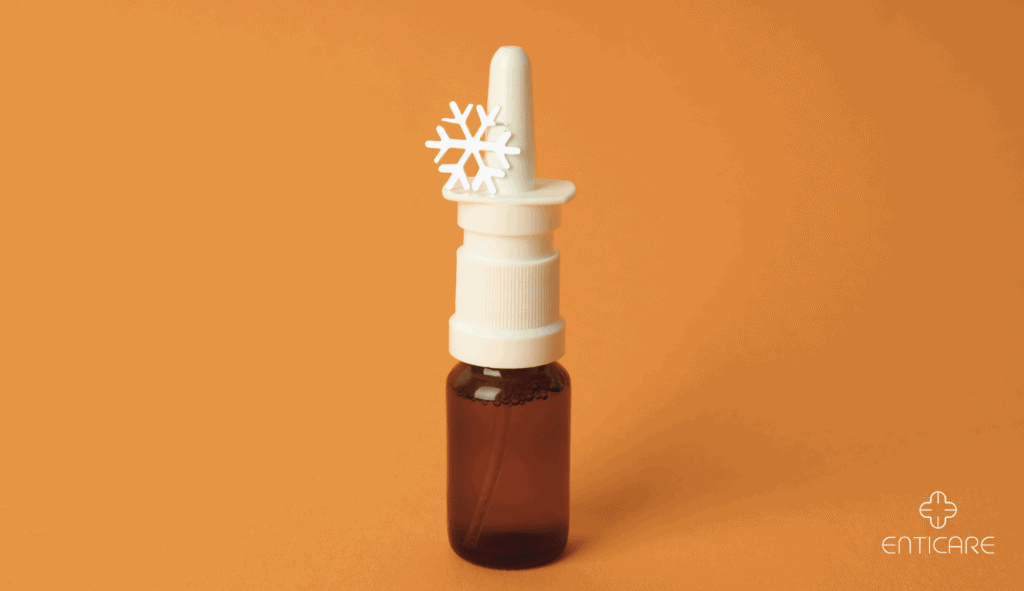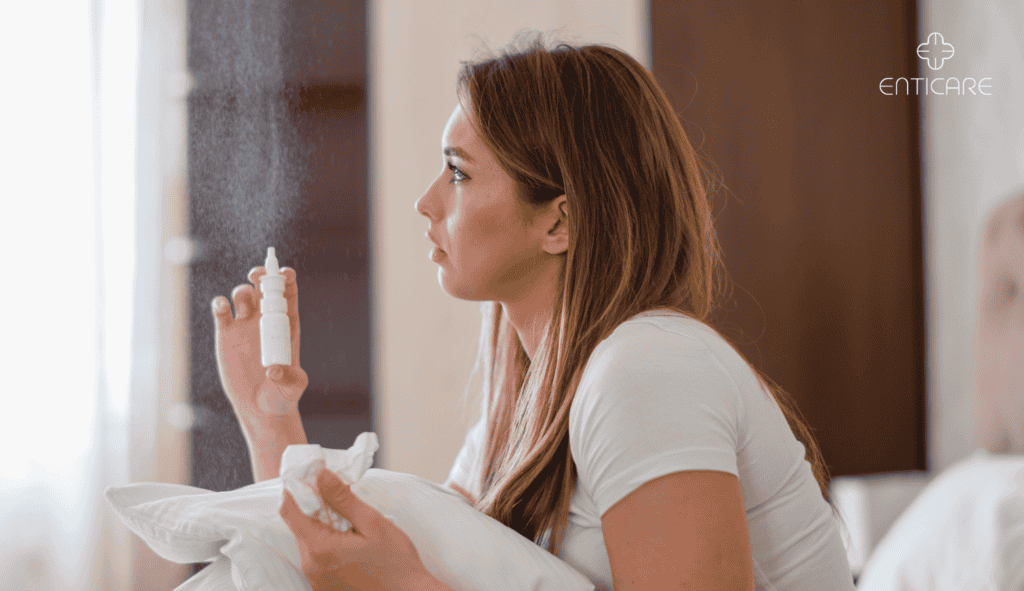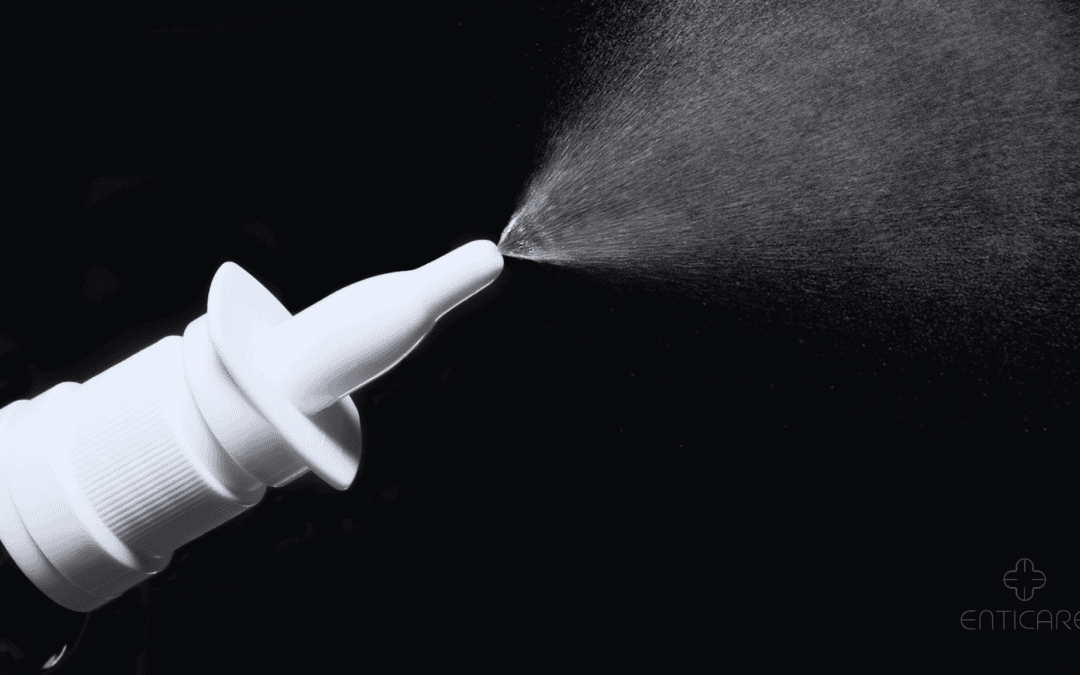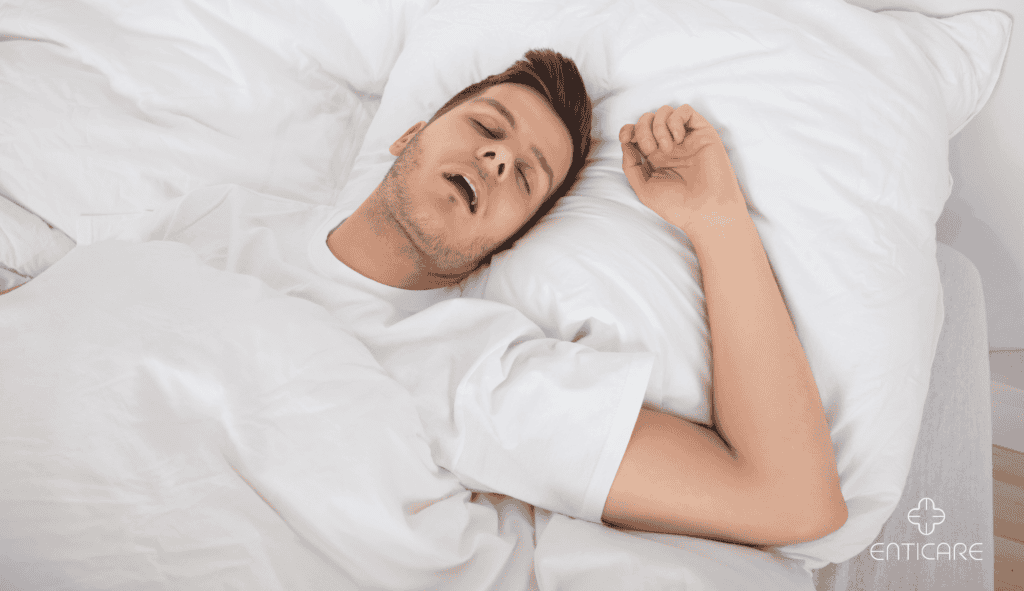Snoring is more than just a nuisance; it often signals underlying health problems, particularly sleep apnea. Otolaryngology-Head & Neck Surgery is a medical specialty that deals with surgical and non-surgical interventions for sleep-disordered breathing, highlighting the importance of the head and neck region in treatment. If you or a loved one struggles with snoring, finding a practical solution is essential for better sleep and overall health. Nasal Spray, the active ingredient of nasal fluticasone, has shown potential benefits in reducing inflammation and symptoms associated with sleep apnea in children by decreasing upper airway resistance. Can Nasal Spray help reduce snoring or even improve sleep apnea symptoms? In this blog, we will dive into how Flonase works, its potential as a treatment for snoring, and how it fits into the broader landscape of sleep apnea treatments.

Understanding Snoring and Sleep Apnea
Before exploring nasal Spray as a treatment option, it’s crucial to understand the connection between snoring and sleep apnea.
Snoring vs. Obstructive Sleep Apnea
Snoring on its own can be harmless, but when it is accompanied by periods of stopped breathing, it may indicate sleep apnea. Obstructive sleep apnea (OSA) occurs when the airway becomes blocked during sleep, causing the person to wake up frequently and disrupting normal breathing. Obstructive sleep apnoea in children can lead to various medical treatments and considerations, highlighting the ineffectiveness of specific therapies and the need to address underlying causes. The field of otolaryngology-Head & Neck Surgery specifically addresses pediatric obstructive sleep apnea and its treatments, focusing on both surgical and non-surgical interventions in the head and neck region.
Nasal Congestion and Snoring
Nasal congestion is a common culprit behind snoring and can sometimes be linked to sleep apnea. When your nasal passages are blocked, it forces you to breathe through your mouth while you sleep. This can cause the tissues in your throat to vibrate, leading to the familiar sound of snoring. Various factors can contribute to nasal congestion, including allergies, colds, and anatomical issues like a deviated septum. Addressing nasal congestion is crucial for reducing snoring and improving overall sleep quality, potentially mitigating sleep apnea symptoms.
Nasal Congestion and Sleep Apnea
Nasal congestion is a common symptom of obstructive sleep apnea (OSA), a condition characterized by the partial or complete obstruction of the upper airway during sleep. It can exacerbate OSA by increasing airflow resistance, making breathing more difficult. In pediatric OSA, nasal congestion is often caused by enlarged tonsils and adenoids, which can obstruct the nasal passages and increase the risk of sleep apnea.
Studies have shown that nasal sprays, such as steroids, can effectively reduce nasal congestion and improve sleep quality in patients with OSA. A study published in the Journal of Sleep Research found that nasal fluticasone, a type of steroid nasal spray, reduced nasal congestion and improved sleep quality in patients with OSA. Another study published in the Journal of Clinical Sleep Medicine found that a nasal spray containing a potassium channel blocker reduced nasal congestion and improved breathing patterns in patients with OSA.
How Nasal Spray Works as a Steroid
A corticosteroid nasal spray primarily treats allergy-related symptoms, but it also offers benefits that could help with snoring and sleep apnea.
Reducing Nasal Inflammation
A steroid nasal spray reduces inflammation in the nasal passages, helping open the airways and allowing for smoother airflow. It also effectively treats nasal polyps, another cause of nasal inflammation. Addressing nasal congestion can reduce one of the significant causes of snoring.
Decreasing Postnasal Drip
Postnasal drip often worsens snoring and sleep apnea symptoms. Nasal Spray reduces mucus production, decreasing postnasal drip, which can help minimize blockages and improve breathing during sleep.
Allergy Symptom Control
Since allergies contribute to nasal congestion and snoring, Nasal Spray can control allergy symptoms and help reduce snoring. For individuals whose sleep apnea or snoring is allergy-related, Nasal Spray offers dual benefits by targeting both allergy symptoms and airway obstruction, which can significantly improve sleep quality.
Can Nasal Spray Treat Sleep Apnea?
While Nasal Spray can relieve snoring, its ability to treat sleep apnea is more nuanced. Let’s explore its role in addressing this sleep disorder.
Treating Sleep Apnea with Nasal Sprays
Nasal sprays, particularly steroid nasal sprays, effectively treat sleep apnea. These sprays work by reducing inflammation in the nasal passages and increasing the diameter of the airway, thereby alleviating airway obstruction and making it easier to breathe during sleep. Nasal Spray, a prescription nasal spray, has been shown to reduce snoring episodes among sleep apnea sufferers. Asonor, another nasal spray, has been clinically tried and tested for proven success in reducing snoring and promoting a smoother, uninterrupted sleep cycle.
Alleviating Mild Sleep Apnea Symptoms
Nasal corticosteroids can help alleviate mild obstructive sleep apnea syndrome symptoms by reducing nasal congestion. When nasal passages are more explicit, airflow improves, which can minimize airway blockages. For individuals with mild OSA, especially those whose symptoms are exacerbated by allergies, Nasal Spray can be part of a treatment plan.
Combining Nasal Spray with Other Treatments
Nasal Spray works best in combination with other sleep apnea treatments. Certain medications can influence muscle activity in the central nervous system, potentially improving upper airway muscle function and reducing airway collapse during sleep. If you use a Continuous Positive Airway Pressure (CPAP) machine, keeping your nasal passages open with Flonase can make the CPAP device more effective. For individuals with nasal congestion, this combined approach enhances the benefits of CPAP therapy.
Limitations of Nasal Spray for Severe Sleep Apnea Severity
Nasal Spray is not a standalone treatment for moderate to severe sleep apnea. In such cases, structural issues like a collapsed airway require more intensive interventions, such as surgery or the use of an oral appliance. Thus, Nasal Spray is a supplementary treatment, not a cure.

Benefits of Nasal Spray for Snoring and Sleep Apnea
Nasal Spray offers several advantages, making it an attractive option for those struggling with snoring and mild sleep apnea symptoms. It can also reduce sleep apnea severity by lowering the frequency of airway collapse during sleep.
Non-Invasive Solution
Unlike surgical interventions or CPAP machines, Nasal Spray is a non-invasive treatment. Regular use can provide significant relief without the need for complex procedures or equipment.
Ease of Use
Nasal Spray is easy to use, requiring a quick daily nasal administration. This simplicity makes it convenient for individuals who might struggle to use more complicated treatments like CPAP machines.
Affordable and Accessible
Nasal Spray is generally affordable and available over the counter. Thus, it is an accessible treatment option for people looking for a cost-effective way to manage snoring or complement other sleep apnea treatments.
Benefits and Risks of Using Nasal Spray for Sleep Apnea
A nasal steroid spray has been studied as a potential treatment for obstructive sleep apnea (OSA). While it may offer some benefits, weighing these against the potential risks is essential.
How to Use Nasal Spray for Snoring
A nasal steroid spray can be a game-changer for those struggling with snoring due to nasal congestion. Here’s how to use it effectively:
Application Techniques
- Shake the Bottle: Before each use, give the bottle a good shake to ensure the medication is well-mixed.
- Clear Your Nose: Gently blow your nose to remove any mucus or debris that might block the Spray.
- Position the Nozzle: Tilt your head slightly forward and insert the nozzle into one nostril. This is an integral part of the nasal spray technique.
- Spray the Medication: Administer the recommended dose into one nostril and repeat the process in the other.
- Breathe In: Inhale gently through your nose to help distribute the medication throughout your nasal passages.
Dosage Recommendations
Typically, the recommended dosage of Nasal Spray for snoring is one or two sprays per nostril per day. However, it’s vital to follow the specific dosage instructions provided by your doctor or those on the product label. Keep in mind that Nasal Spray may not be suitable for everyone, including pregnant women, nursing mothers, and individuals with certain medical conditions. Always consult with a healthcare provider before starting any new treatment.
Take Control of Your Sleep Health
If you’re struggling with snoring or suspect sleep apnea, Nasal Spray may provide some relief, mainly if nasal congestion contributes to your symptoms. However, while Nasal Spray can help alleviate snoring and mild sleep apnea symptoms, it is not a cure for more severe forms of the condition.
For those dealing with persistent snoring or sleep apnea, professional treatment remains the best option for long-term relief. An evaluation with a sleep specialist can determine the best action and create a tailored treatment plan to improve your sleep quality and overall health.
Don’t let snoring or sleep apnea affect your quality of life. Please schedule an appointment with one of our sleep specialists to get the care you need today.


